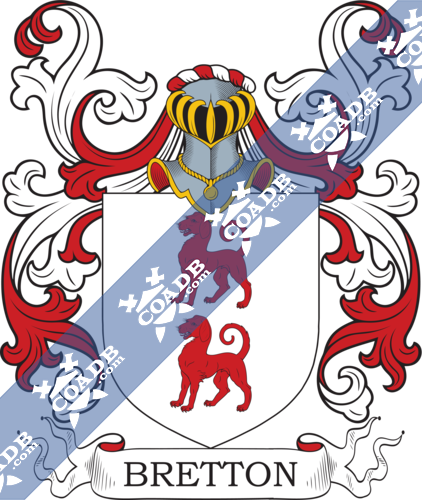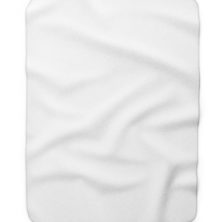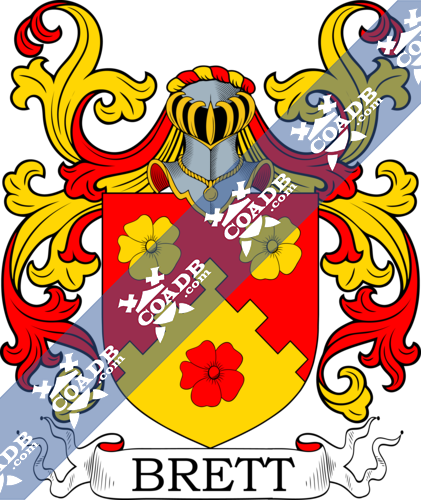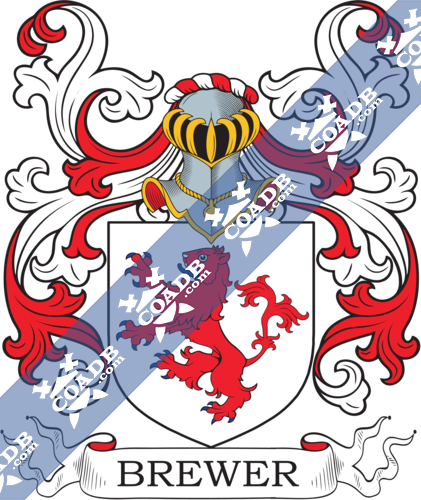Bretton Family Crest, Coat of Arms and Name History

Bretton Coat of Arms Gallery
Don’t know which Coat of Arms is yours?
We can do a genealogical research. Find out the exact history of your family!
Learn MoreBretton Origin:
France
Origins of Bretton:
This interesting surname, of Old French origin, acquires from the Old French “Bret”, nominative of “Breton”, which means a Breton, from the Latin “Britto”, compared to the Old Celtic “Britto”, and was originally given as an ethnic name to a person from Brittany. The Bretons were early Celtic-speakers, and residents of South West England, known as Britons, who in the 6th Century were largely dismissed by Anglo-Saxon attackers and driven away as foreigners to North West France. Five centuries later, some of the Bretons re-entered England as part of William the Conqueror’s invading army in 1066. One Edward Brit was listed in the Domesday Book of 1086 for Devonshire, and a Walter Bret shows in the 1164 Staffordshire Chartulary. The difference between “i” and “e” points to the Olde English “Brit, Bret”, which meant a Briton, and was used to show a representative of one of the Celtic-speaking peoples of Strathclyde until the year 1300. Ranulph Brito or Le Breton (died 1246) was the command of St. Paul’s, and receiver to the king. The surname was noted in English Parish Records under the various spelling forms like Brittoy, Brittaux, Bretta and Brytoe. Salomon Brittaux named at the French Huguenot Parish, Threadneedle Street, London, in May 1660, and in December 1687, the wedding of Rachel Britto to John Powell took place at St. James’, Duke’s Place, also in London.
Variations:
More common variations are: Baretton, Brettoni, Breitton, Brettone, Beretton, Brietton, Breton, Brtton, Berettoni, Barettoni.
France:
The origins of the surname Bretton appeared in Brittany, where people held a family seat from old times. Someone say better before the invasion of Normans and the entrance of Duke William at Hastings 1066 A.D.
The very first recording spelling of the family was shown to be that of Tihellus Brito, dated about 1086, in the “Domesday Books of Essex.” It was during the time of King William I, who was known to be “William the Conqueror,” dated 1066-1087. The origin of surnames during this period became a necessity with the introduction of personal taxation. It came to be known as Poll Tax in England.
Ireland:
Many of the people with surname Bretton had moved to Ireland during the 17th century.
United States of America:
Individuals with the surname Bretton landed in the United States in two different centuries respectively in the 17th, and 19th. Some of the people with the name Bretton who arrived in the United States in the 17th century included William Bretton, who landed in Maryland in 1637. Temperance Bretton, who came to Maryland in 1649. Seayone Bretton, who arrived in Maryland in 1654. George Bretton, who landed in Maryland in 1657. Stephen Bretton, who landed in Maryland in 1661
The following century saw more Bretton surnames arrive. Some of the people with the name Bretton who arrived in the United States in the 19th century included Joseph Bretton, who arrived in Allegany (Allegheny) Division, Pennsylvania in 1828.
Here is the population distribution of the last name Bretton: United States 365; France 318; England 204; Switzerland 99; Peru 57; Belgium 37; Australia 35; Canada 32; New Zealand 7; Montserrat 6.
Notable People:
Bretton Byrd (1904–1959) was a British writer and composer known for his work on film scores between 1932 and 1956. He worked for British Gaumont, then the largest British production company, in the 1930s.
Bretton Cameron (born 1989), is a Canadian ice hockey player.
Raphaël Bretton (February 1920–February 2011) was a French set decorator. He won an Academy Award and was selected for three more in the category Best Art Direction.
William Frederick Bretton (May 1909-November 1971) was the Minister of Nelson from 1957 until 1970. He got an education at Downing College, Cambridge and was appointed in 1935. His first posts were curacies in Watford and Sparkhill. He was Minister of St Cuthbert Birmingham from 1939 to 1942, and then St John the Evangelist, Sandown. In New Zealand, he held incumbencies in Johnsonville and Lower Hutt before his job as Minister.
Blazons & Genealogy Notes
1) (Visit. Oxon). Ar. two hounds paleways gu. Source: Burke’s.







